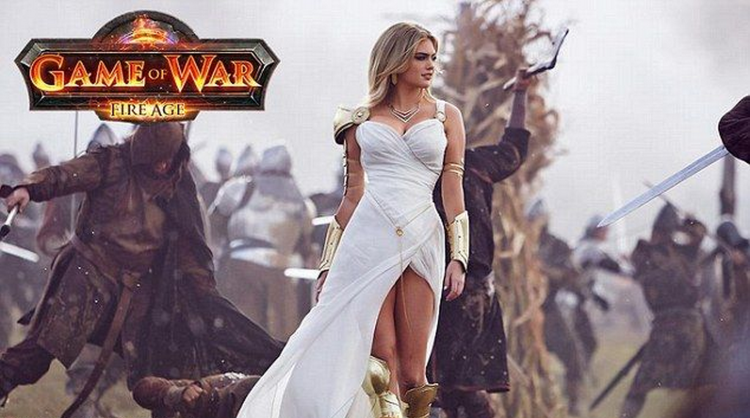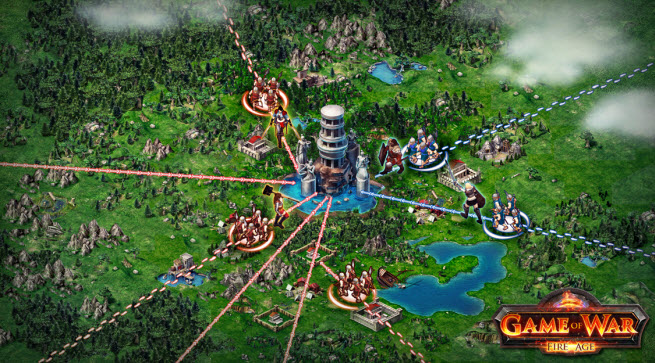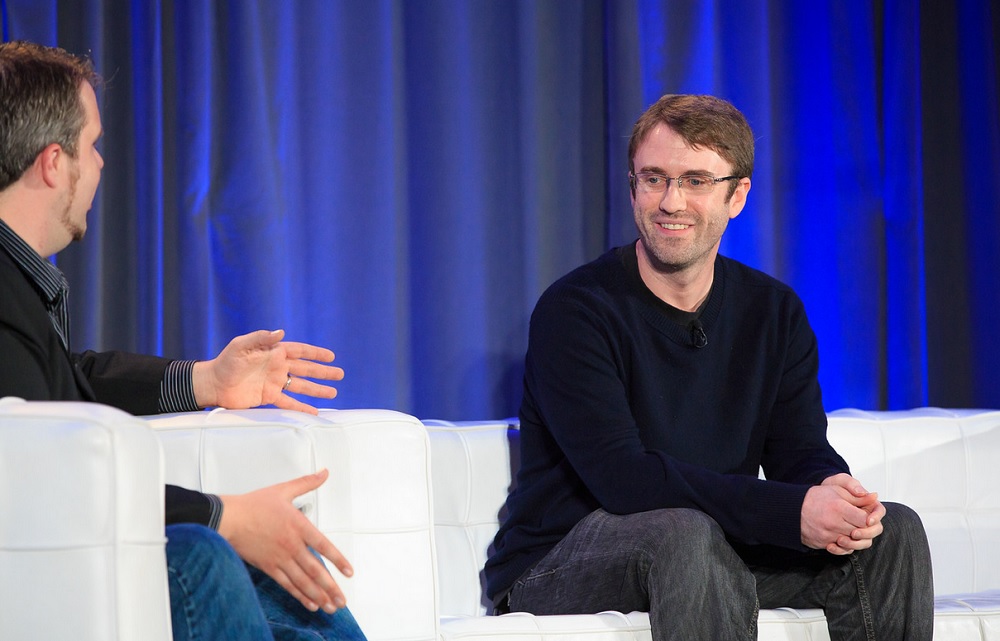Supermodel Kate Upton has done wonders for helping people become aware of Machine Zone‘s mobile game, Game of War: Fire Age. Commercials with her starring as Athena in the game are everywhere, both on TV and on mobile devices — including a famous Super Bowl ad. But that ubiquitous advertising presence is also creating a problem for Machine Zone, prompting the company to try to raise a new round of funding.
We’ve heard from multiple sources that Palo Alto, Calif.-based Machine Zone is seeking to raise $500 million at a multibillion-dollar valuation. So far, the round hasn’t happened, and we have heard that the pitch has met with skepticism. There’s a lot we don’t know about the funding or the financial status of Machine Zone, and, frankly, the news about the fundraising efforts puzzles us.
Gabe Leydon, the chief executive of Machine Zone, said in an email, “We do not comment on rumors and speculation about fundraising or valuation, but [Machine Zone] does not need additional investment. We are 100 percent focused on [Game of War] and expanding on the technology that powers it.”
That statement went beyond the “no comment” I expected. And it is carefully worded. It doesn’t say that the company isn’t seeking additional venture funding. It just says that it doesn’t need it. Needs, of course, can change from moment to moment in a volatile game industry. Indeed, if Machine Zone ratchets down its ubiquitous advertising, it may not need any funding. On the other hand, if it eases up on ad spending too much, it could lose its place in the top ranks.
We have no idea whether Machine Zone will find the investors it wants. But deals of this size are rare for private game companies. Japan’s SoftBank recently bought a 23 percent stake in Supercell, which has the No. 1 mobile game, Clash of Clans, for $1.2 billion. That valued Supercell, which has only 150 employees and made revenues of $1.7 billion last year, at $5.5 billion.
Machine Zone’s own revenues are not public. King’s Candy Crush Saga, the third top-grossing game on mobile devices, generated an average of $2.55 million a day in the first quarter. Game of War is likely making more than that since it has consistently been ranked above Candy Crush Saga on the top-grossing charts. That suggests that Game of War could be generating more than $230 million per quarter, or perhaps $930 million a year.
That’s a lot of money for a free-to-play game. Players can download the game on iOS or Android for free. They only purchase items with real money if they want to accelerate their progress in the game. Typically, only 2 to 5 percent of players spend money, based on data from public companies. But Machine Zone has a title that has proven to be extremely sticky and very good at monetizing its audience.
That’s the payoff from a huge bet that Leydon made on a single game. And no, the bet wasn’t on Kate Upton. Long before Machine Zone hired the supermodel to play the Athena character in Game of War, Leydon made a wager that lifted the company out of obscurity.
Leydon founded the company in 2007 under the name Addmired, with cofounders Mike Sherrill and Halbert Nakagawa. They were trailing behind Zynga on Facebook, so they focused on MySpace apps at the beginning. In 2008, they used a small amount of funding from the Y Combinator incubator to create a free-to-play game on the iPhone. That title, iMob, took off. More titles, which resembled massively multiplayer online games, followed.
The company raised $5 million in 2011, and it raised another $8 million from Menlo Ventures, Anthos Capital, and Baseline Ventures in 2012. In 2013, the company changed its name to Machine Zone, and it put the venture money to good use.
Leydon assigned 80 people to work for 19 months on Game of War: Fire Age. The team created a versatile communications system so that players could join together in clans and communicate in real time in many different ways. They can talk to their clan friends in a big group or talk one-on-one via chat. The team also built a real-time translation layer so that players from around the world could join the same clan and communicate with each other. The game was exceedingly good at keeping everything synchronized as players made moves or attacked each other.
The translation system enabled the creation of clans that could fend off attackers 24 hours a day because some clanmates were always awake. And Machine Zone layered a Civilization-like strategy game on top of the technologies — one that was designed to enable players to spend as much as they wanted to impress their clanmates and defeat enemies. A Belgian publication reported that a 15-year-old Game of War player from Antwerp spent $41,400 on in-app purchases on his mother’s credit card.
Machine Zone launched the game in July 2013. All of that work paid off with a top-grossing mobile title. The title steadily climbed the charts, and it settled in at No. 2 or No. 3, behind Clash of Clans and Candy Crush Saga. At the moment, Game of War is the No. 2 top-grossing title.
Machine Zone has now grown to more than 300 people, or about twice the size of rival Supercell. That’s still a very small number of employees relative to revenues, and it means that Machine Zone’s built-in costs can’t be all that high.
That raises the question. If Leydon’s company makes so much money from a single game, why does Machine Zone need to raise money? The logical answer is that the company is spending ahead of its revenue.
Of course, Machine Zone had been rumored to be doing the exact same thing before, and no outcome was ever announced. The Wall Street Journal reported in July 2014 that Machine Zone was trying to raise a $250 million round of funding at a $3 billion valuation. That round was never announced, but several sources believe that JPMorgan Chase finalized an investment. JPMorgan apparently wants others to invest in the current round, sources say, as it is evidently not going to provide all of the funding itself this time. At the time, the WSJ reported that Machine Zone was expecting to generate more than $600 million in revenue in 2014.
Machine Zone is reportedly working on a new game. It has to, as Game of War: Fire Age is churning through users, and it will eventually run out of new players to recruit. All games have this problem of churn, and we don’t know how severe Machine Zone’s challenges are. But the laws of gravity apply to games. Eventually, all games lose their popularity. Machine Zone has a long way to go before it flashes ads in front of all of the world’s mobile device users in the hopes of recruiting replacement players. But at some point, the heavy advertising is bound to become less effective. We have no idea if Machine Zone has reached a saturation point.
Machine Zone hired Upton to star in its TV ads last fall, and then it used her in a Super Bowl commercial that also cost millions of dollars. But we hear that Machine Zone is pouring a lot of the money that comes in from Game of War: Fire Age — which has been in the top five top-grossing games for years now — right back into user acquisition.
We don’t know if the rumor, reported by TMZ, is true that Machine Zone will replace Upton with pop singer Mariah Carey in an upcoming TV commercial. Carey is reportedly getting seven figures for the commercial, and that might actually be a way to cut the costs of advertising.
Whatever happens, Machine Zone will be known for putting mobile gaming on the map in a big way, giving play on smartphones and tablets a new profile with the unforgettable Upton campaign.
We are still doing reporting and will update this story if necessary.
VentureBeat's mission is to be a digital town square for technical decision-makers to gain knowledge about transformative enterprise technology and transact. Learn More



